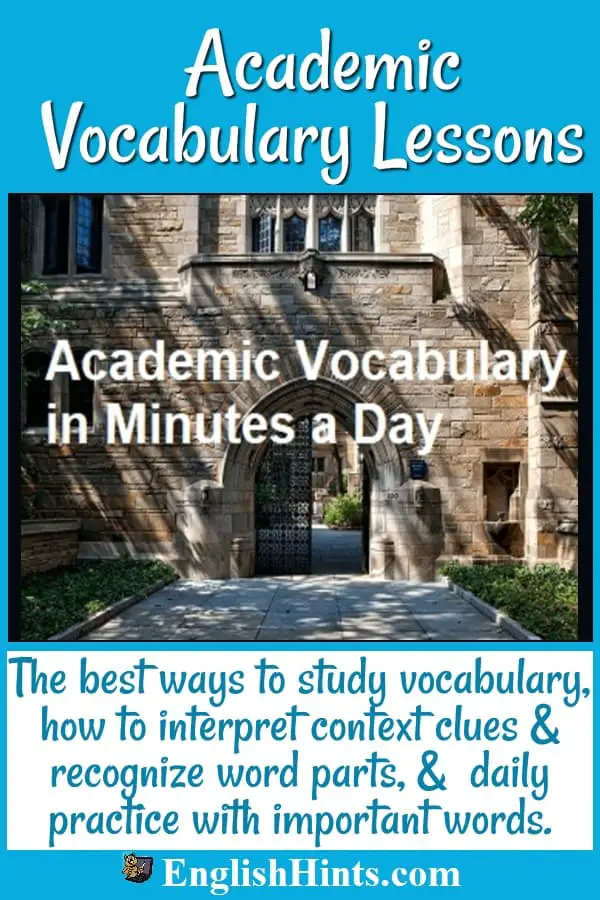Academic Vocabulary Lessons:
the Words You Need in Minutes a Day
Academic Vocabulary Lessons in Minutes a Day
Are you feeling overwhelmed by the vocabulary you need to pass university exams? Have you considered academic vocabulary lessons, but just don’t have the time to fit another class into your schedule? How can you learn the words you need for university work along with all the other things you need to do?
Could 20-30 Minute Academic Vocabulary Lessons Help?
If you study and practice with these vocabulary lessons for 20-30 minutes a day for three or four weeks, you can learn the basic skills to master academic English.
A month from now you can face the challenges ahead with new confidence in your ability to recognize, understand, and retain new words.
> You will be able to predict the meaning of new words based on context clues (the words around them.)
> You will recognize common prefixes, suffixes, and some word roots—which will help you understand many more words.
> You will also have learned and practiced over 50 of the most useful words found most frequently in scientific articles, textbooks, and academic tests.
I have used and taught this vocabulary for years, but this is a pilot course for me to learn what is most useful for students and professionals who want to improve their English vocabulary. So, I’ll work closely with students to find the best ways to master these skills.
This first time the course will also be less expensive, and I’ll be flexible and make changes in any confusing parts, as well as adding extra lessons or materials as needed.
What’s Included?
I’m thinking of organizing the course by week, with 5 or 6 lessons each. Lessons would begin with a short explanation—usually a video-- and then practice materials or a quiz.
Week 1:
- How to Study Vocabulary
- Context Clues
- Word Decoding (Roots & Affixes)
- Vocabulary Practice (based on a reading selection that uses and explains some key vocabulary.)
Week 2:
- Vocabulary Describing Assessment Criteria (what examiners are looking for)
- Understanding Essay Prompt Vocabulary
- Essay Structure (each with a reading passage demonstrating important vocabulary, followed by more practice)
- Vocabulary for Comparisons & Charts (2 or 3 lessons)
Week 3 (& probably 4): Vocabulary for:
- Persuasion
- Cause & Effect
- Inference
- More subjects as requested by course students
These Academic Vocabulary Lessons Are NOT For
> Beginning English learners. (Instead start with the everyday vocabulary you need for simple conversations and daily activities.)
> People who do not plan on university study or professional careers (& don't enjoy reading.)
The course will emphasize the basic professional and academic vocabulary used repeatedly in various careers & disciplines (and in instructions and essay prompts). It does not teach the much less common words used by word enthusiasts on lists of vocabulary.
> Exam-takers with less than a month or two before your exam. (If you have very little time, it’s far more important to study and practice with official exam materials. You need to get familiar with the structure of the exam and the expectations of the examiners.
Use any free time you have to take practice tests using exam time limits and conditions, because it does get easier with practice. You might want to check my free short course on Strategies for the TOEFL & IELTS. (It gives useful urls and an explanation of test structure and the criteria examiners use to score the exams—what the examiners are looking for.)
This Course IS For
Intermediate (& up) English learners who
> have limited study time
> want to study at English-speaking universities, or
> already work (or plan to work) in a profession or academic field that requires using English, or
> love to learn about science, history, or the arts and understand that a lot of good information on those subjects on the Internet is in English
> love reading or getting involved in intelligent discussions with people from many parts of the world (Those will often be in English, and often rely heavily on academic vocabulary)
If You Want to Know More
This first session of the course will be $27 for all the lessons and practice materials, as well as a weekly session where you can ask me questions or request help with any problems.

Your satisfaction guaranteed. Please contact me if you have any problems or questions. If you are not happy with this course, please contact me for a full refund (or a credit plus 10% on a different course if you prefer.)
If you find the course helpful please take a moment to let me know and to share it. Thanks!
Reduce the stress in your life! Study these simple vocabulary lessons for a few minutes a day…
If you’re interested in learning more, please sign up below—and share this with anyone you know who is trying to increase their academic English vocabulary. (If you have questions, or suggestions for vocabulary or subjects you would like covered, I’d be happy to respond. You can reach me via the contact form below the sign up.)
